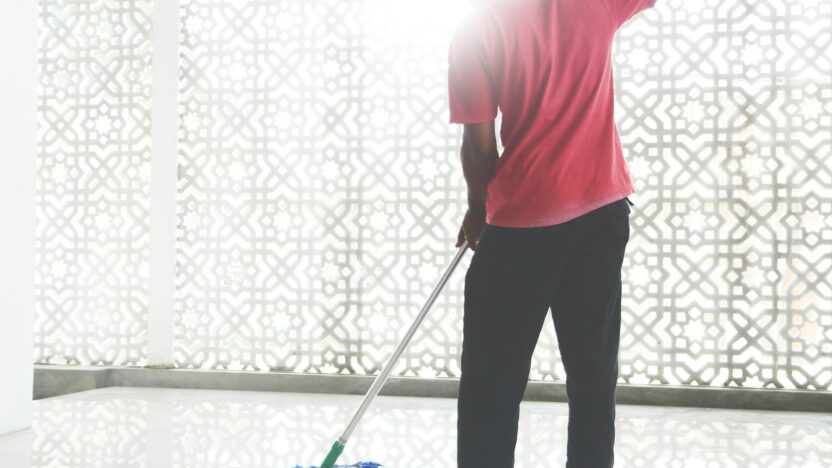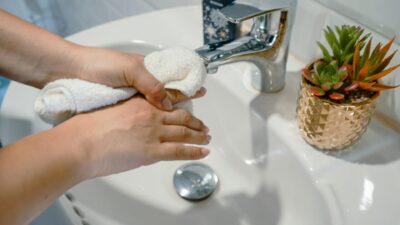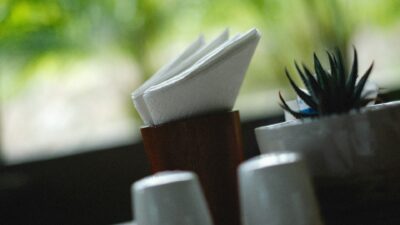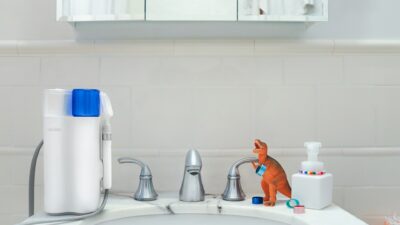Keeping your floors clean with natural, eco-friendly products is a safe and sustainable choice for your home. DIY floor cleaners avoid harsh chemicals, protect your floors, and reduce plastic waste from store-bought bottles. Whether you have wood, tile, or vinyl, this guide offers tailored recipes and tips for sparkling floors. For more green cleaning ideas, visit For Organic Life.
Recipes for Wood, Tile, and Vinyl Floors
Different floor types need specific cleaners to stay in top shape. Here are recipes for common surfaces:
- Hardwood Floor Cleaner: Mix 1/4 cup white vinegar, 1 gallon warm water, and 5 drops lemon essential oil in a bucket. Mop lightly with a damp microfiber mop. Vinegar cleans gently, and lemon adds shine.
- Tile Floor Cleaner: Combine 1/2 cup baking soda, 1/4 cup castile soap, and 1 gallon warm water. Stir until dissolved, then mop tiles. Rinse with clean water to avoid residue.
- Vinyl Floor Cleaner: Blend 1 cup white vinegar, 1 tablespoon dish soap, and 1 gallon warm water. Mop vinyl floors, then rinse to prevent stickiness.
Test cleaners in a small, hidden area to ensure they don’t damage finishes. Use minimal water on wood to avoid warping. These recipes are safe, effective, and keep your floors looking great without synthetic chemicals.
Avoiding Harmful Chemicals in Floor Cleaning
Conventional floor cleaners often contain chemicals like ammonia or bleach, which can harm floors, health, and the environment. Here’s why natural cleaners are better:
- Safer for Health: Natural ingredients like vinegar or soap don’t release toxic fumes, reducing risks for allergies or respiratory issues.
- Gentle on Floors: Harsh chemicals can strip wood finishes or dull tiles. Natural cleaners preserve surfaces longer.
- Eco-Friendly: Biodegradable ingredients don’t pollute waterways, unlike chemical cleaners that harm aquatic life.
- Less Waste: DIY cleaners use reusable bottles, cutting down on plastic packaging.
Check product labels to avoid greenwashing—terms like “natural” aren’t regulated. Stick to proven ingredients like baking soda or vinegar. By avoiding chemicals, you create a safer home and a cleaner planet.
Tools for Effective Floor Cleaning
The right tools make floor cleaning easier and more sustainable. Here’s what to use:
- Microfiber Mops: These trap dirt and dust without excess water, ideal for wood or vinyl. Choose washable pads made from recycled materials.
- Wooden Brooms: Use a broom with natural bristles for sweeping. They’re durable and compostable at end of life.
- Reusable Cloths: Cut old towels into squares for spot-cleaning or drying floors. Wash in eco-friendly detergent.
- Buckets: Reuse plastic or metal buckets from other household items to mix cleaners, avoiding new purchases.
Avoid disposable mop pads or wipes, which add to landfill waste. Clean tools after use to prevent bacteria buildup—boil cloths or wash mop heads in hot water. Store tools in a dry place to extend their life. These eco-friendly tools pair perfectly with your DIY cleaners.
Maintaining Floors with Natural Methods
Regular maintenance keeps floors beautiful and reduces the need for deep cleaning. Here’s how:
- Sweep Daily: Remove dirt and grit with a broom to prevent scratches, especially on wood or tile.
- Spot-Clean Spills: Wipe spills immediately with a damp cloth to avoid stains or warping. Use a drop of castile soap for sticky messes.
- Polish Wood: Mix 1/4 cup olive oil with 1/4 cup vinegar for a natural wood polish. Apply sparingly with a cloth monthly.
- Refresh Tiles: Sprinkle baking soda on tiles and mop with warm water to restore shine every few months.
Vacuum with a floor-safe attachment to avoid scratches. Place mats at entrances to trap dirt. Avoid over-wetting floors, especially wood, to prevent damage. These natural methods keep your floors in top condition while staying eco-friendly.
Customizing Cleaners for Specific Floor Types
Tailoring cleaners to your floor type ensures the best results. Here are variations:
- Sealed Wood: Add 1 tablespoon castile soap to the hardwood recipe for extra cleaning power on sealed floors.
- Porous Tiles: Use 1/2 cup vinegar in the tile recipe for grout stains, scrubbing with a brush for deep cleaning.
- Luxury Vinyl: Dilute the vinyl recipe with more water (1/2 cup vinegar per gallon) for sensitive finishes.
- Laminate: Mix 1/4 cup rubbing alcohol, 1/4 cup vinegar, and 1 gallon water for streak-free laminate cleaning.
Experiment with essential oils like peppermint for a fresh scent or tea tree for antibacterial properties. Keep a notebook to track recipes that work best. Customizing cleaners lets you address specific needs while keeping your floors eco-friendly. For more cleaning tips, check out For Organic Life.
Shining Floors, Sustainably
DIY natural floor cleaners keep your home beautiful and eco-friendly. With tailored recipes, chemical-free cleaning, sustainable tools, maintenance tips, and customizable solutions, you can care for every floor type naturally. Start with one recipe and enjoy sparkling, green floors. Happy mopping!




